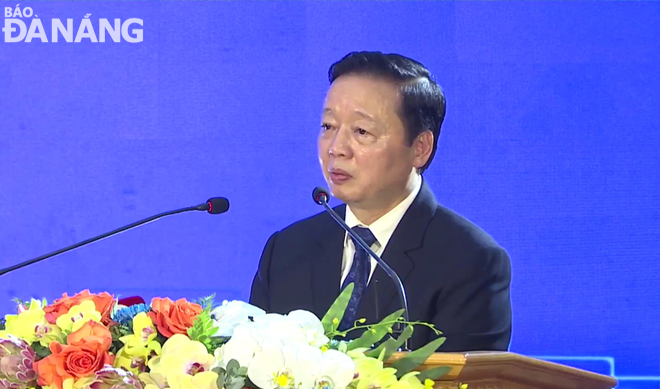Da Nang on way to develop semiconductor industry
Viet Nam wants to strengthen cooperation with countries and territories worldwide in research, training and development of the semiconductor industry ecosystem. It is committed to offering the best possible facilitation for enterprises, including those specialising in developing and manufacturing semiconductor chips, to do business in the country.
 |
| Deputy Prime Minister Tran Hong Ha speaking at the conference. Photo: M.Q |
The remarks were made by Deputy Prime Minister Tran Hong Ha at an international conference on Vietnamese semiconductor human resources in the global supply chain.
The event was held in Ha Noi on Saturday by the Phenikaa Group, the Synopsys Group, and the University of Arizona.
It was attended by Deputy Prime Minister Tran Hong Ha, Minister of Information and Communications Nguyen Manh Hung, Da Nang Party Committee Secretary Nguyen Van Quang, and municipal People's Committee Chairman Le Trung Chinh.
In his opening speech delivered at the conference, Deputy Prime Minister Tran Hong Ha emphasised that the semiconductor industry was a foundation industry, and a core part of the electronics industry, playing an important role in the current development of the new technologies and technological solutions.
The semiconductor and microchip industry is globalized with high requirements for investment in production, labor qualifications, size, and processing performance, which determine the competitiveness of products and the advantages of manufacturers.
The value chain of microchip manufacturing (excluding sales and distribution) comprises of six stages: material manufacturing; semiconductor chip production equipment manufacturing; design tools; design (including system design and design processing); manufacture; assembly; packaging; and testing.
In this value chain, no country or territory has achieved complete strategic autonomy, but there is mutual dependence and assignment. Therefore, promoting research, investment, and development of the semiconductor industry is becoming a new "race" between countries and economies in the 21st century.
The national official highlighted Viet Nam’s advantages of a favourable investment and business environment, incentive investment attraction policies, young human resources with basic qualifications, convenient sources of raw materials in the trend of shifting regional and global production chains.
He also remarked that Viet Nam had increasingly important international position and reputation in the world, as well as established comprehensive strategic partnerships with most countries with developed semiconductor industries.
In the comprehensive strategic partnership between Viet Nam and the U.S., the bilateral cooperation in high technology is expected to be a bright spot in their bilateral relations in the years ahead.
The country signed a Memorandum of Understanding with the U.S. to cooperate in developing the semiconductor ecosystem within the framework of President Joe Biden's recent visit in September 2023.
Recently, the world’s leading semiconductor manufacturing corporations such as Nvidia, Intel, and Samsung have had many working visits, affirming their interest in promoting research about investment and development opportunities, targeting to build key semiconductor production centres in Viet Nam.
Thus, it can be said that Viet Nam is clearly aware of the role and importance of the semiconductor industry and is currently having a great opportunity to become a strategic destination in the semiconductor industry's global supply chain.
Viet Nam is racing against time and has taken specific, methodical, and fundamental steps to create a favourable premise and environment for the development of the industry.
Accordingly, the national government is concentrating on building a strategy to develop the semiconductor industry and a project to train human resources for the semiconductor industry according to international standards.
Quickly building a team of high-quality human resources with deep expertise in semiconductor is considered a key problem, an opportunity, and also the biggest challenge for Viet Nam to fully tap its potential and advantages, and to participate well in the trillion-dollar value chain of the semiconductor industry.
Deputy Prime Minister Ha took the opportunity to ask for support from leading enterprises in semiconductor technology to help Viet Nam well develop the field.
He affirmed that his country was committed to creating a favourable business and academic environment to encourage innovation, research, development, and manufacturing in the semiconductor sector.
The national government acknowledged the participation of Da Nang and other relevant partners as well in investing in infrastructure and human resources, building a specific action programme, and committing to the development of Vietnam's microchip human resources.
Reporting by M.QUE - Translating by M.DUNG, P.TRA